"Extremely professional service. Always on-hand for support through the entire recruitment process"
Ben White

What is a panel interview?
Page Overview:
At Aaron Wallis Sales Recruitment, we guide employers in orchestrating effective panel interviews that deliver deeper insight and fairer evaluations. This page explains how to create a varied panel by involving interviewers from diverse disciplines, designating a clear chair to prepare panellists on the job description, CV, and candidate profile, and ensuring everyone understands their questioning role. Whether conducted in person or via video, we demonstrate how to maintain structure through shared agendas, tech rehearsals, and facilitation, ensuring the process remains insightful and smooth. Use this guide to refine your panel interviews for clarity, equity, and strategic decision-making.
A panel interview is a type of job interview where a candidate is questioned by multiple interviewers simultaneously. Typically composed of representatives from different departments or seniority levels, panel interviews provide a comprehensive evaluation by assessing skills, experience, and compatibility with the company culture, streamlining the hiring process.
But what are the benefits, and how do you lead a panel interview? Here, we'll explain why it's a valuable tool in your recruitment armoury.
The benefits of panel interviewing
There are four key advantages to panel interviews:
-
- In a multi-function role that straddles departments, it helps to expose the candidate to more of their future bosses and colleagues
- It can make logistical sense to get those interviewers in one place simultaneously rather than calling a candidate back.
- Hopefully, the panel will form a common opinion of the candidate, reinforcing a hire or pass decision.
- Some recruiters believe you see more of the job seeker's real character under the duress of a panel interview. At the same time, they also like to know how the candidate communicates with people from different positions.
An example of a role suitable for a panel interview might be a PR management position. This candidate would work across the business and so might be seen by HR, the Head of PR, an existing PR/internal comms employee and potentially a manager from marketing. All would have valuable input in assessing the candidate.
Because you'll be drawing upon many people's time for this exercise, you'll want to have shortlisted candidates at earlier one-to-one interviews before exposing them to the panel.
Planning for a panel interview
The first task is to establish who should be on the interview panel. Your interviewers should have different fields of expertise and perspectives on the job. This should give the business a thorough representation and provide the candidate with a good insight into the organisation they are trying to join.
You then must establish who will lead. But how do you chair an interview panel? The role here is to prepare other members in advance about:
-
- The job description
- The candidate's CV
- Your ideal candidate profile
- Any additional relevant information pertinent to the position
Ensure all panel members are aware of their responsibilities and the types of questions they are expected to ask. Make sure the panel arrives in good time.
The lead will meet and greet the candidate, introduce them to the rest of the panel, and then chair the questions, answers and general discussion, much like David Dimbleby on the BBC's Question Time!
The panel interview chair's role is to ensure the candidate has had a fair opportunity to present themselves and that the organisation has got the clearest possible picture of the candidate's suitability.
What questions should I ask at a panel interview?
It's likely your panel's line of questioning won't differ significantly from what might be expected during a one-to-one interview. The difference is that each question should come from a relevant member of the panel, which can change how the candidate answers, giving a clearer behavioural or cultural fit insight.
For example, the question: "How would your colleagues describe you?" puts the candidate under more pressure to be sincere if asked by a potential teammate who is sitting in on the panel. Whereas the hiring manager would ask: "Tell me about a situation where there was tension with a client or co-worker?" since that would be a strange question from the potential teammate!
It's important to remember how intimidating a panel interview might be. While this is good for assessing true character, your line of questioning should not be aggressive – you'll get more out of the process if the potential recruit is more relaxed and opens up.
Are panel interviews possible over video call?
In 2025 and post-pandemic, many panel interviews are happening over Teams or Zoom. Here are some tips for a panel interview over video call:
Pre-Interview:
- Shared Agenda: Collaborate on a digital document outlining the interview flow, candidate info, and pre-determined questions. This keeps everyone on the same page.
- Tech Rehearsal: Don't skip a quick test call with the panel. Iron out any audio, video, or screen sharing issues beforehand.
The Interview:
- Introductions: A designated moderator sets the stage by welcoming everyone and introducing panellists with their titles.
- Question Flow: Decide on a question format. Will panellists take turns or have an open discussion with follow-ups? The moderator ensures everyone gets a chance to participate.
Tech Tips:
- Screen Sharing: Leverage screen sharing for presentations or collaborative brainstorming with the whiteboard feature.
- Mute Mics: Panellists not currently speaking should mute their microphones to minimise background noise.
Should I use competency, value or situational interview questions?
In most cases, you'll be asking a mixture of all three. However, specific roles, or the bespoke nature of your business, might necessitate concentrating on one area:
Competency-based interview questions
-
- Will focus on the specific skills needed within a role. This might suit functions such as IT, where skill, knowledge and experience are the key. This person will not be customer-facing or dealing with colleagues in the wider business to any great extent.
Value-based interview questions
-
- Ideal for establishing a candidate's cultural fit for your organisation. Do they share your company values, goals and working ethic? If you're a business that thrives on innovation and teamwork, can the candidate demonstrate these traits from previous roles?
Situational interview questions
-
- Can establish how a candidate has resolved frictions or challenges in the past, such as with a manager, colleague, or client-facing role. This might be more suited to potential managers to probe their management style. The issue with this line of questioning is being confident that the candidate isn't just saying what they think you want to hear.
How should I follow up a panel interview?
The panel interview should not end when the candidate walks out of the office door. Instead, the panel needs to reconvene to discuss its findings while the interview is still fresh in everyone's minds. Hopefully, you have arranged the interviews in reasonably quick succession, allowing you to give the winner the good news in a reasonable time. You should then provide transparent and honest feedback to those who missed out.
If you're an employer looking for support with your recruitment process, please get in touch with Aaron Wallis Sales Recruitment.
Employer Advice Categories
Navigate our other Employers Advice categories by clicking the following icons:
Date published: 5th August 2025

by Rob Scott
Managing Director

About the author
Rob Scott
Please call us to discuss your vacancy
From our blog
Our employers say...
Our candidates say...





